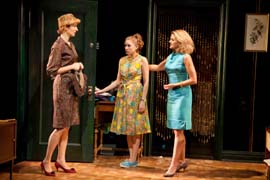
Paulanne Simmons
"A Charity Case" Is Wanting
"A Charity Case"
Directed by Wendy Beckett
Clurman Theatre at Theatre Row
410 West 42nd Street
Opened Nov. 1, 2011
Tuesday at 7pm, Wednesday thru Saturday at 8pm, matinees at 2pm Saturday
& 3pm Sunday
Tickets: $35 (212) 239-6200 or www.Telecharge.com
Closes Nov. 20, 2011
Reviewed by Paulanne Simmons Nov. 2, 2011
 |
| Alysia Reiner, Alison Fraser and Jill Shackner. Photos by Kevin Thomas Garcia. |
"A Charity Case" by Australian playwright Wendy Beckett asks some interesting questions. How does a young girl growing up in an adoptive family navigate the dangerous waters between her two mothers? What happens to the mother who gave up her child? Are people really capable of accepting another person’s child as their own?
These questions have become even more significant since open adoptions started offering people the opportunity to communicate with birth parents and their adopted children. But Beckett undermines her play’s potential by turning the birth mother and the adoptive mother into freaks with whom the audience cannot (or perhaps will not want to) identify.
Harpie (Alysia Reiner), the birth mother, opens the show as a mysterious, waif-like creature who has committed terrible crimes. One imagines that anyone would be a better parent than this woman. Then we meet Faith (Alison Fraser), the adoptive mother. She is a self-absorbed dress designer and an overly critical parent who destroys her daughter, Deidre (Jill Shacker), willfully and mercilessly.
We see Faith ripping up the dress Deidre wants to wear on a date, pushing the youngster away when she asks for affection and forever bringing the conversation back to herself. Curiously, she allows her current boyfriend to beat her up. But given her miserable personality one sort of roots for the boyfriend.
 |
| Alysia Reiner,
Jill Shackner and Alison Fraser. Photos by Kevin Thomas Garcia. |
Shacker is the most successful at giving her character any believability, which is not surprising given that Beckett’s writing probably made the roles of the two mothers impossible to play. Harpie is never really a person and Faith is a caricature of the mother from hell. But if the play had been directed by anyone but the author, there might have been hope for some moderation.
A good director who was not the playwright might have asked a few important questions: What specifically do these characters want? Why is Faith such a bitch? Why does Deidre continue to care about such a person, and what does she hope to get from her birth mother, who has begun sending her letters? And most important, such a director might have asked for some action to replace the endless bickering between Faith and Deidre.
Under the unswerving, unforgiving eye of such a director, many of the wrinkles in the play might have been ironed out. Even better a good director (or dramaturge) might have told Beckett that this play is simply not ready for production.
"A Charity Case" has all the earmarks of a first
play. So it was a surprise to learn that Beckett is the author of more than
25 plays and the director of over 40. She’s also written radio plays,
books and librettos. What’s more she’s an academic and a journalist.
If only a great resume meant a great play.

| museums | NYTW mail | recordings | coupons | publications | classified |